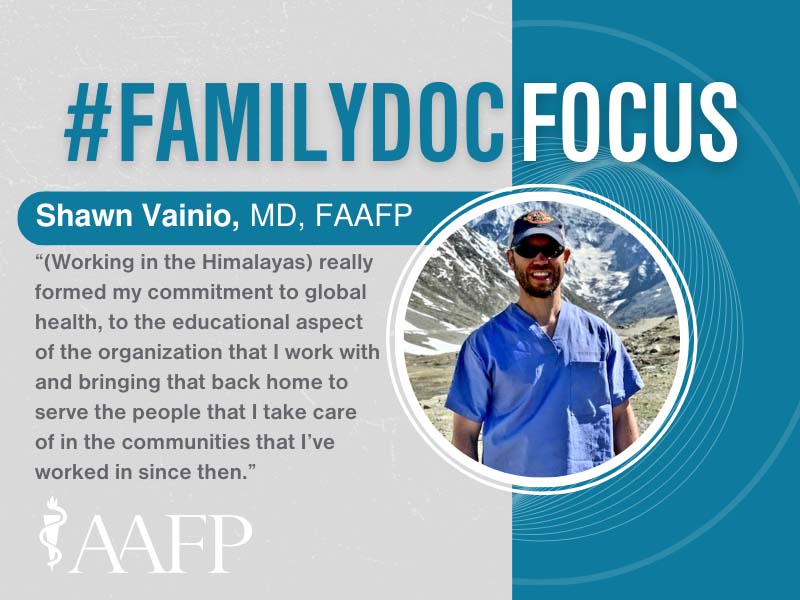Alaska Doc Has Passion for Global Health
Jan. 30, 2024, David Mitchell — Once or twice a year for nearly a decade, Shawn Vainio, M.D., FAAFP, used to make the trip from his tiny hometown in western New York to see his pediatric cardiologist in Rochester.

Vainio eventually overcame his arrhythmia but his interest in medicine remained. He studied chemistry and biology at Niagara University before entering SUNY Buffalo School of Medicine and Biomedical Sciences with plans to be a pediatric cardiologist.
“I wanted to give something back,” he said.
But it didn’t take long for the student from a town of 2,000 people to realize his lifestyle and his specialty choice didn’t fit.
“I didn’t want to live in a big city,” he said, “and I didn’t want to work in a big city. I wanted to be a small town doctor.”
Vainio has checked that box with stops across the Pacific Northwest, Alaska and even Antarctica. One of his first jobs after completing family medicine residency training at the University of Utah was working as the only clinician at an Antarctic research station for seven months. He also spent nearly two years working for a hospital system at seven rural sites in Alaska, Oregon and Washington, providing inpatient, outpatient and obstetric care.
Vainio took a one-month elective in wilderness medicine during medical school. Now it’s his reality.
“I live wilderness medicine,” he said. “This time of year, it’s common to deal with hypothermia and frostbite. Through the years, I’ve seen bear attacks, capsized kayaks and boats, drownings and near drownings, plane crashes, snow machine accidents, ATV accidents. That’s pretty much the bread and butter of the emergency trauma care here.”
Since 2017, Vainio has lived with his wife and daughter 27 miles southeast of Anchorage in Girdwood, Alaska. However, he works 340 miles west of Anchorage in Bethel for the Yukon Kuskokwim Health Corp.
In Bethel, Vainio works 12- to 14-hour shifts for 10 to 14 days a month, providing emergency, inpatient and obstetrical services. The health system covers the Yukon-Kuskokwim Delta, serving roughly 26,000 people in more than 50 native villages spread across 50,000 square miles.
Vainio’s affinity for practicing in cold, remote locations actually predates his career in Alaska. As a fourth-year medical student, he took an elective with the Himalayan Health Exchange. During that initial trip, Vainio made two trips to remote areas with a mobile medical unit and then spent a month with a local surgeon in Ladakh, India.
“It was absolutely an eye-opening experience and forever changed my career trajectory,” said Vainio, who started serving on the health exchange’s advisory panel when he was a resident in 2005. “It changed the way I look at medicine in the United States, the way I interact with patients and my understanding of what we now call the social determinants of health. That wasn’t even a term back then, but that doctor understood his patients’ social history and backgrounds. We had patients who would walk for days to see us with severe medical conditions. It really formed my commitment to global health, to the educational aspect of the organization that I work with and bringing that back home to serve the people that I take care of in the communities that I’ve worked in since then.”
Vainio, who received the AAFP’s Humanitarian Award in October during the Congress of Delegates in Chicago, has been back to the Himalayas 16 times in the past two decades.
“I try to do a month every year, and we take teams of 20 to 30 physicians, medical students, residents, dentists and dental students from around the world — the U.S., Canada, the U.K., Ireland, Denmark, Sweden, Iceland, New Zealand, Australia — and it’s pretty cool to learn from our team members’ medical experiences in their own countries because medical delivery is so different in different places.”
Vainio said his work in the Himalayas wasn’t “premeditated preparation” for his current practice, and Alaska wasn’t on his radar until a Utah program graduate called looking for someone to cover for his practice in Kodiak when Vainio was a third-year resident.
In Kodiak, Vainio practiced full-spectrum family medicine, including obstetrics, for nearly a decade.
“The locations definitely translate with one another really well, being remote, low-resource settings with cold environments,” he said. “It’s the perfect setup. It really is as close as I can have to a practice in the Himalayas.”
Since moving to Girdwood, Vainio has taken on an active role in the Alaska AFP. After serving as his chapter’s alternate delegate to AAFP Congress of Delegates in 2018 and COD delegate in 2019 and 2020, he has served as chapter president-elect, president and past president.
“My initial employment in Kodiak was all-consuming,” he said. “I was focused on serving the community, covering the ER, the hospital and the ICU, deliveries, newborns, the nursing home and clinic. There were few opportunities to become involved in a bigger way. Once I left that job, I realized that if I were to make an impact for my fellow family physicians, I had to get involved on a bigger scale. I’ve been able to give back by representing rural docs.”